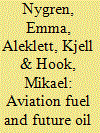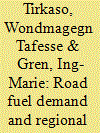| Srl | Item |
| 1 |
ID:
091571


|
|
|
|
|
| Publication |
2009.
|
| Summary/Abstract |
Crude oil is a limited natural resource subject to depletion and several reports indicate that the world's crude oil production is close to the maximum level and that it will start to decrease after reaching this maximum. A post-Kyoto political agenda to reduce oil consumption will have the same effect on aviation fuel production as a natural decline in the crude oil production. On the other hand, it is predicted by the aviation industry that aviation traffic will keep on increasing.
|
|
|
|
|
|
|
|
|
|
|
|
|
|
|
|
| 2 |
ID:
091518


|
|
|
|
|
| Publication |
2009.
|
| Summary/Abstract |
Because of high oil prices, and climate change policy, governments are now seeking ways to improve new car fuel economy thus contributing to air quality and energy security. One strategy is to increase dieselisation rates of the vehicle fleet. Recent trends in fuel economy show improvement since 1995, however, efforts need to go further if the EU Voluntary Agreement targets on CO2 (a greenhouse gas emission standard) are to be achieved. Trends show diesel car sales have accelerated rapidly and that the advantage of new car fuel economy of diesel cars over gasoline ones is narrowing posing a new challenge. We estimate the demand for new car fuel economy in the UK. In the long-run consumers buy fuel economy, but not in the short-run. We found that long-term income and price changes were the main drivers to achieve improvements particularly for diesel cars and that there is no break in the trend of fuel economy induced by the agreement adopted in the 1990s. Policy should target more closely both consumer choice of, and use of, diesel cars.
|
|
|
|
|
|
|
|
|
|
|
|
|
|
|
|
| 3 |
ID:
109383


|
|
|
|
|
| Publication |
2011.
|
| Summary/Abstract |
Reducing energy consumption and CO2 emissions in the transport sector is a priority for Great Britain and other European countries as part of their agreements made in the Kyoto protocol and the Voluntary Agreement. To achieve these goals, it has been proposed to increase the market share of diesel vehicles which are more efficient than petrol ones. Based on partial approaches, previous research concluded that increasing the share of diesel vehicles will decrease CO2 emissions (see [1] and [18]; Zervas, 2006). Unlike these approaches, I use an integral approach based on discrete choice models to analyse diesel vehicle penetration in a broader context of transport in Great Britain. I provide for the first time, empirical evidence which is in line with Bonilla's (2009) argument that only improvements in vehicle efficiency will not be enough to achieve their goals of mitigation of energy consumption and CO2 emissions. The model shows the technical limitations that the penetration of diesel vehicles faces and that a combination of improvements in public transportation and taxes on fuel prices is the most effective policy combination to reduce the total amount of energy consumption and CO2 emissions among the analysed dieselisation polices.
|
|
|
|
|
|
|
|
|
|
|
|
|
|
|
|
| 4 |
ID:
176833


|
|
|
|
|
| Summary/Abstract |
This study estimated national and regional-level gasoline and diesel demand elasticities in Sweden using county-level panel data from 2001 to 2018. The estimated elasticities were used to calculate county cost effect of the Swedish CO2 emission reduction policy in the transport sector. The national-level elasticities were estimated by employing general method of moments (GMM) estimators, while county-level elasticities were calculated by considering the weight of each fuel type share at county and national levels. Own prices, per capita income, and per capita vehicle stocks were statistically significant at national level in determining gasoline and diesel demand. The calculated regional price elasticities showed variation between counties, with the highest being almost 4 times higher than the lowest in absolute terms. A simulation of fuel taxes to achieve the Swedish 2030 emission target for the transport sector under the national and regional price elasticities indicated minor differences at the national level with respect to CO2 taxes, costs and regressivity in the taxes. The results showed considerable differences at the regional level where costs and carbon tax payments can be considerably higher for some counties with the use of national price elasticities and the opposite is the case for other counties.
|
|
|
|
|
|
|
|
|
|
|
|
|
|
|
|